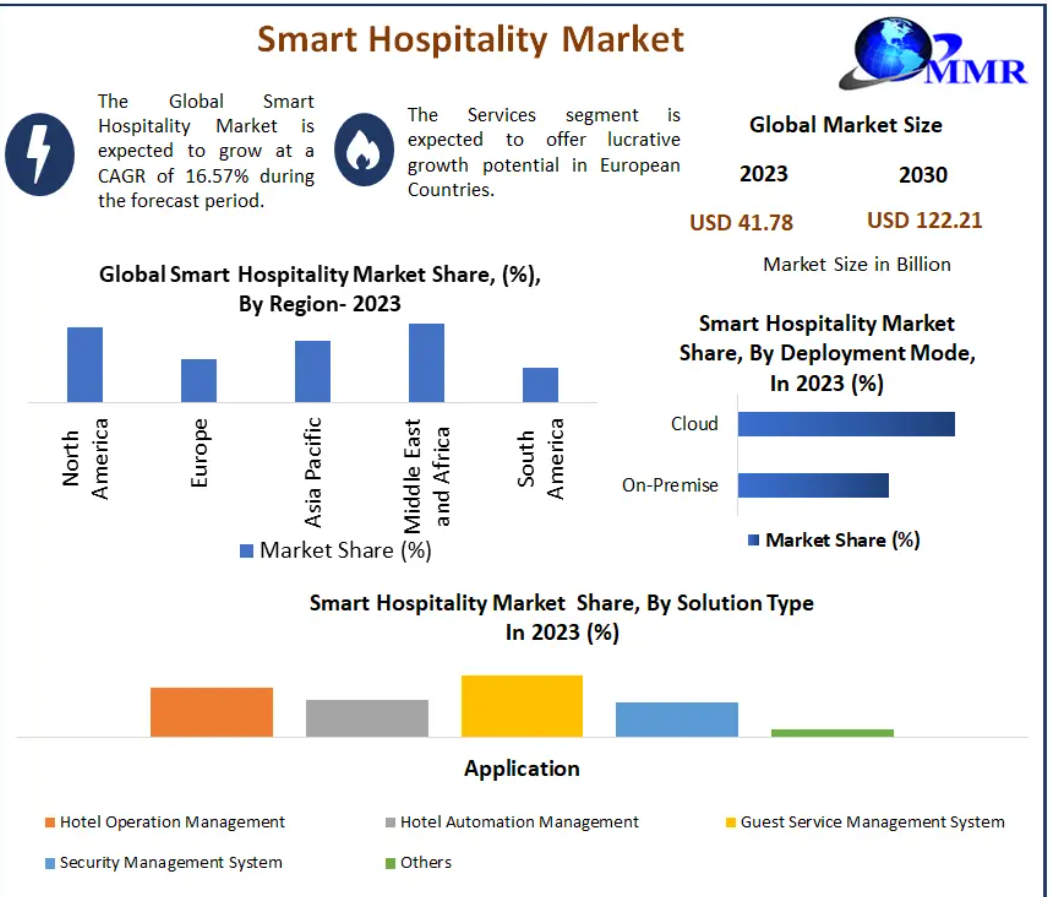-
Новости
- ИССЛЕДОВАТЬ
-
Страницы
-
Группы
-
Мероприятия
-
Статьи пользователей
-
Offers
-
Jobs
-
Courses
Smart Hospitality Market Trends 2024-2030: Contactless Check-In, Smart Rooms, and Guest Personalization

Global Smart Hospitality Market Outlook 2024–2030
The Global Smart Hospitality Market is experiencing rapid growth, driven by the convergence of technology and hospitality to create intelligent, seamless guest experiences. Valued at USD 41.78 billion in 2023, the market is projected to reach USD 122.21 billion by 2030, growing at a CAGR of 16.57% during the forecast period. The expansion of smart hospitality is transforming the traditional hospitality sector by integrating advanced technologies like Internet of Things (IoT), Artificial Intelligence (AI), and data analytics to improve operational efficiency, enhance guest satisfaction, and maximize profitability.
To know the most attractive segments, click here for a free sample of the report:https://www.maximizemarketresearch.com/request-sample/13824/
Transforming Guest Experiences with Technology
Smart hospitality solutions are revolutionizing guest services, offering personalized experiences, energy efficiency, and streamlined operations. Key technologies such as IoT-enabled devices, AI-driven analytics, and contactless systems allow hotels, resorts, and luxury accommodations to create connected ecosystems that respond dynamically to guest preferences. For example, smart thermostats adjust room temperatures, lighting can be personalized, and AI systems can offer recommendations for dining, entertainment, and local attractions.
Additionally, contactless check-in/check-out, keyless entry systems, and biometric authentication enhance security while providing a smooth, convenient experience for tech-savvy travelers. Mobile apps and in-room tablets allow guests to access information about amenities, place room service orders, or interact with concierge services, making the stay more personalized and efficient.
Market Drivers
1. Growing Tourism Industry:
The expansion of global tourism is a major driver for the smart hospitality market. Modern travelers increasingly expect immersive, personalized, and tech-enabled experiences, prompting hotels to adopt advanced solutions to meet these demands. With more people traveling internationally, smart hospitality technologies are crucial for catering to diverse preferences, language requirements, and cultural expectations.
2. Rising Investment in Technology:
Significant investments in smart hospitality platforms are driving market growth. For example, Stayntouch secured a $48 million growth equity investment to enhance its hotel management solutions, integrating reservations, payments, and multi-property management in a single platform. Increasing tech spending allows hotels to implement IoT, AI, and cloud-based systems, optimizing operational efficiency and guest satisfaction.
3. Government Initiatives and Support:
Governments worldwide are promoting smart technologies in hospitality through grants, tax incentives, and smart city initiatives. Programs like the UK’s TechEmerge Sustainable Cooling Innovation Program in India highlight efforts to integrate energy-efficient, sustainable solutions in hotels. These initiatives encourage the adoption of smart systems that align with environmental goals while improving service quality.
Market Restraints
Despite rapid growth, certain challenges exist:
-
High implementation costs for hardware and software.
-
Need for skilled personnel to manage and maintain smart hospitality systems.
-
Integration complexity across legacy systems in older establishments.
To know the most attractive segments, click here for a free sample of the report:https://www.maximizemarketresearch.com/request-sample/13824/
Segment Analysis
By Solution Type:
-
Guest Service Management System (GSMS): Dominates the market by enabling personalized experiences, automated services, and enhanced guest engagement.
-
Hotel Operation Management and Hotel Automation Management: Streamline operations and optimize resources.
-
Security Management Systems: Enhance safety through smart access control, surveillance, and AI-based monitoring.
By Deployment Mode:
-
Cloud: Leading deployment model due to scalability, reduced upfront costs, remote management capabilities, and enhanced data security.
-
On-Premise: Suitable for hotels preferring internal infrastructure and direct control over systems.
By End-User:
-
Hotels: Account for the largest revenue share, leveraging smart solutions to improve operational efficiency and guest satisfaction.
-
Cruises, Luxury Yachts, and Other Accommodation: Also adopting smart technologies to enhance luxury experiences and streamline operations.
Regional Insights
North America leads the global smart hospitality market, driven by tech-savvy consumers, robust R&D investments, and the presence of leading technology providers. Europe and Asia Pacific are also witnessing growth, fueled by smart city initiatives, rising tourism, and the adoption of IoT and AI technologies in hotels and resorts.
To know the most attractive segments, click here for a free sample of the report:https://www.maximizemarketresearch.com/request-sample/13824/
Key Players
Global players driving innovation in the smart hospitality market include:
-
IBM Corporation (USA)
-
Siemens AG (Germany)
-
Schneider Electric (France)
-
Honeywell International (USA)
-
Cisco Systems, Inc. (USA)
-
Oracle Corporation (USA)
-
Huawei Technologies (China)
-
NEC Corporation (Japan)
-
SAMSUNG (South Korea)
-
Cloudbeds (USA)
Regional leaders also contribute to market growth: BuildingIQ, Johnson Controls, and Frontdesk in North America, and Winhotel Solutions and Guestline in Europe.
Future Outlook
The smart hospitality market is expected to continue its rapid growth trajectory as hotels and resorts increasingly adopt AI, IoT, and cloud-based solutions. By offering personalized guest experiences, improving operational efficiency, and aligning with sustainability goals, the market is reshaping hospitality globally. The convergence of tourism growth, technological advancements, and government initiatives ensures that the smart hospitality sector will remain a key driver of innovation and value in the hospitality industry through 2030 and beyond.
- Art
- Causes
- Crafts
- Dance
- Drinks
- Film
- Fitness
- Food
- Игры
- Gardening
- Health
- Главная
- Literature
- Music
- Networking
- Другое
- Party
- Religion
- Shopping
- Sports
- Theater
- Wellness
